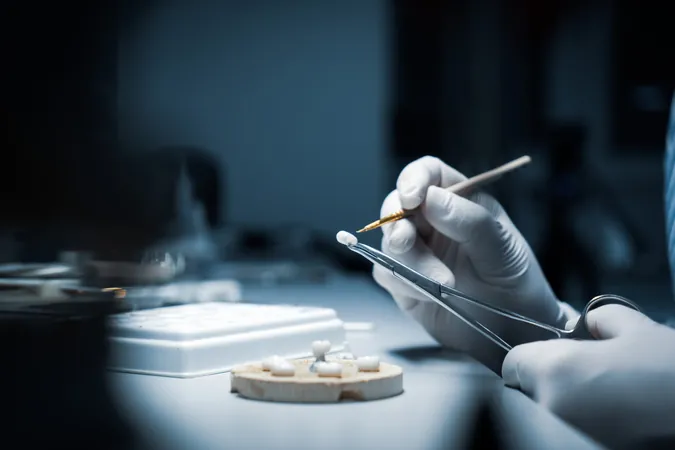
Revolutionary Lab-Grown Teeth: The Future of Dental Care?
2025-04-15
Author: Sarah
In a groundbreaking advancement for dental science, researchers at King’s College London have developed lab-grown teeth that could revolutionize the way we think about dental repairs. These innovative teeth might just replace traditional fillings, offering a more natural and effective solution.
For over a decade, scientists at King’s College have been on a quest to cultivate lab-grown teeth as a viable alternative to conventional fillings and dental implants. Unlike their rigid counterparts, these lab-grown marvels are designed to integrate seamlessly into a patient’s jaw and possess the remarkable ability to self-repair, mimicking the form and function of natural teeth.
According to Xuechen Zhang from the Faculty of Dentistry, Oral & Craniofacial Sciences at King’s College London, traditional fillings often weaken the tooth structure over time, leading to decay and sensitivity. Implants, while an alternative, require invasive procedures and don’t restore teeth to their original function. "Both methods fall short of providing a permanent, natural solution to dental health issues,” Zhang explains.
Creating a Breakthrough Environment for Tooth Growth
Collaborating with researchers at Imperial College London, the team has discovered a revolutionary method to create the ideal environment for lab-grown teeth. By introducing a special material that facilitates communication between cells, scientists can effectively guide the cells to differentiate into tooth tissue. This novel approach simulates the natural tooth development process.
Zhang elaborates, "Previous attempts to grow teeth failed because they overwhelmed the cells with signals all at once. Our new material gradually releases these signals, closely resembling the natural growth process. This allows us to cultivate teeth more effectively.”
Next Steps: Bringing Lab-Grown Teeth to Patients
As exciting as this breakthrough is, the researchers are now focused on clinical applications. Two possible methods are on the table: transplanting young tooth cells directly into the mouth for in situ growth, or cultivating complete teeth in the lab before placement.
Zhang notes, "Whichever route we take, our main goal is to initiate the earliest stages of tooth development in our lab, paving the way for real dental care advancements.”
Shaping the Future of Dentistry
This pioneering research signifies a monumental leap toward integrating regenerative medicine into dentistry. By utilizing stem cells and engineered biomaterials, the team aims to eliminate the need for artificial materials like metal implants.
Dr. Ana Angelova Volponi, a leading author on the paper, emphasizes the transformative potential of these technologies, stating, "As we proceed, the integration of groundbreaking techniques like lab-grown teeth could redefine dental care, providing sustainable solutions for tooth repair and regeneration.”
Zhang concludes, "Lab-grown teeth have the potential to regenerate naturally and integrate flawlessly into the jaw, offering a stronger, longer-lasting, and biologically compatible alternative to traditional fillings and implants.”



 Brasil (PT)
Brasil (PT)
 Canada (EN)
Canada (EN)
 Chile (ES)
Chile (ES)
 Česko (CS)
Česko (CS)
 대한민국 (KO)
대한민국 (KO)
 España (ES)
España (ES)
 France (FR)
France (FR)
 Hong Kong (EN)
Hong Kong (EN)
 Italia (IT)
Italia (IT)
 日本 (JA)
日本 (JA)
 Magyarország (HU)
Magyarország (HU)
 Norge (NO)
Norge (NO)
 Polska (PL)
Polska (PL)
 Schweiz (DE)
Schweiz (DE)
 Singapore (EN)
Singapore (EN)
 Sverige (SV)
Sverige (SV)
 Suomi (FI)
Suomi (FI)
 Türkiye (TR)
Türkiye (TR)
 الإمارات العربية المتحدة (AR)
الإمارات العربية المتحدة (AR)